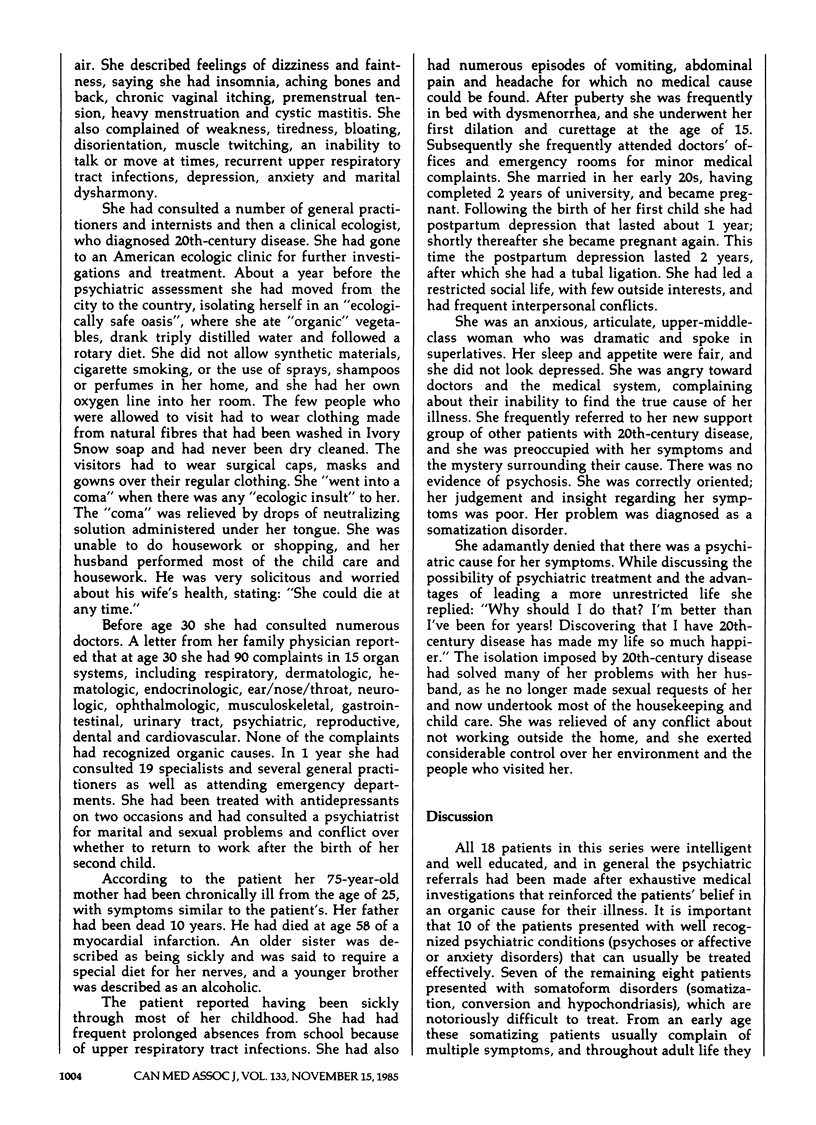Abstract
“Twentieth-century disease”, or “total allergy syndrome”, is a condition attributed to hypersensitivity to the environment that may sometimes be seen as so serious that the patient is incapable of living in the modern world. Although the popular media frequently carry stories about it, there is little scientific literature. It is diagnosed by clinical ecologists, who maintain, among other theories, that susceptible individuals experience an overload in assaults by artificial materials in the environment. The patients usually have multiple ill defined symptoms for which no organic cause can be found, but they vigorously resist psychiatric referral, as they attribute their symptoms to allergy. A group of 18 patients who were purportedly suffering from 20th-century disease were referred to a university psychiatric consultation liaison service. They virtually all had a long history of visits to physicians, and their symptoms were characteristic of several well known psychiatric disorders. The case histories and management of three of them are presented. Although this group of patients may have been atypical in that they had more severe psychologic symptoms, the experience indicates that a psychiatric diagnosis ought to be considered. The symptoms of 20th-century disease have much in common with other conditions known to physicians for centuries.
Full text
PDF





Selected References
These references are in PubMed. This may not be the complete list of references from this article.
- Brodsky C. M. 'Allergic to everything': a medical subculture. Psychosomatics. 1983 Aug;24(8):731-2, 734-6, 740-2. doi: 10.1016/S0033-3182(83)73168-3. [DOI] [PubMed] [Google Scholar]
- King D. S. Can allergic exposure provoke psychological symptoms? A double-blind test. Biol Psychiatry. 1981 Jan;16(1):3–19. [PubMed] [Google Scholar]
- Lipowski Z. J. Review of consultation psychiatry and psychosomatic medicine. 3. Theoretical issues. Psychosom Med. 1968 Jul-Aug;30(4):395–422. doi: 10.1097/00006842-196807000-00005. [DOI] [PubMed] [Google Scholar]
- Lowy F. H. Management of the persistent somatizer. Int J Psychiatry Med. 1975;6(1-2):227–239. doi: 10.2190/QP8D-GP4V-YBWA-9VEH. [DOI] [PubMed] [Google Scholar]
- Lum L. C. "Total allergy". Br Med J (Clin Res Ed) 1982 Apr 3;284(6321):1044–1045. doi: 10.1136/bmj.284.6321.1044-d. [DOI] [PMC free article] [PubMed] [Google Scholar]
- May C. D. Food allergy--material and ethereal. N Engl J Med. 1980 May 15;302(20):1142–1142. doi: 10.1056/NEJM198005153022009. [DOI] [PubMed] [Google Scholar]
- May C. D. Food allergy: lessons from the past. J Allergy Clin Immunol. 1982 Mar;69(3):255–259. doi: 10.1016/s0091-6749(82)80001-8. [DOI] [PubMed] [Google Scholar]
- Nixon P. G. "Total allergy syndrome" or fluctuating hypocarbia? Lancet. 1982 Feb 13;1(8268):404–404. doi: 10.1016/s0140-6736(82)91440-4. [DOI] [PubMed] [Google Scholar]
- Pearson D. J., Rix K. J., Bentley S. J. Food allergy: how much in the mind? A clinical and psychiatric study of suspected food hypersensitivity. Lancet. 1983 Jun 4;1(8336):1259–1261. doi: 10.1016/s0140-6736(83)92707-1. [DOI] [PubMed] [Google Scholar]
- Rippere V. Food allergy: how much in the mind? Lancet. 1983 Jul 2;2(8340):45–45. doi: 10.1016/s0140-6736(83)90026-0. [DOI] [PubMed] [Google Scholar]
- Rix K. J., Pearson D. J., Bentley S. J. A psychiatric study of patients with supposed food allergy. Br J Psychiatry. 1984 Aug;145:121–126. doi: 10.1192/bjp.145.2.121. [DOI] [PubMed] [Google Scholar]
- Sim E. S. The need for scientifically trained allergists. Can Med Assoc J. 1982 Feb 1;126(3):225–225. [PMC free article] [PubMed] [Google Scholar]


